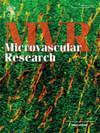Proteomics suggests the role of Cxcl12 secreted by hucMSCs in the treatment of lipopolysaccharide-acute lung injury
IF 2.9
4区 医学
Q2 PERIPHERAL VASCULAR DISEASE
引用次数: 0
Abstract
Acute respiratory distress syndrome (ARDS) is a clinical syndrome characterized by a high mortality rate, and its treatment is relatively straightforward. The application of human umbilical cord mesenchymal stem cells (hucMSCs) for the treatment of ARDS has emerged as a novel therapeutic approach and has been the subject of extensive research. In this study, a mouse model of acute lung injury (ALI) was established, and hucMSCs were administered via tail vein injection to investigate the pathogenesis of ARDS and the protein alterations following hucMSC treatment. Data-independent acquisition (DIA) was employed for the proteomic analysis of lung tissue, which included the identification of differentially expressed proteins (DEPs) and their associated pathways. The relevant DEPs identified in the lung tissues of the three groups of mice included Arid5a, Mrpl4, Cxcl12, and Rnf121 (P <0.05). Silencing the expression of Cxcl12 in hucMSCs could significantly inhibit the therapeutic effect of hucMSCs in reducing the permeability of lung tissue and endothelial cells (P < 0.05). Additionally, the signaling pathways associated with the relevant DEPs were analyzed. The DEPs and the enriched pathways discussed herein provide valuable insights into the pathogenesis of ARDS and the potential applications of hucMSCs.
蛋白质组学提示humscs分泌的Cxcl12在脂多糖急性肺损伤治疗中的作用
急性呼吸窘迫综合征(Acute respiratory distress syndrome, ARDS)是一种死亡率高的临床综合征,治疗方法相对简单。应用人脐带间充质干细胞(hucMSCs)治疗ARDS已成为一种新的治疗方法,并已成为广泛研究的主题。本研究建立小鼠急性肺损伤(ALI)模型,通过尾静脉注射给药humscs,探讨ARDS的发病机制及humscs治疗后蛋白的改变。采用数据独立采集(DIA)对肺组织进行蛋白质组学分析,包括鉴定差异表达蛋白(DEPs)及其相关途径。在三组小鼠肺组织中发现的相关DEPs包括Arid5a、Mrpl4、Cxcl12和Rnf121 (P <0.05)。沉默Cxcl12在hucMSCs中的表达可显著抑制hucMSCs降低肺组织和内皮细胞通透性的治疗作用(P <;0.05)。此外,我们还分析了与相关dep相关的信号通路。本文讨论的dep和富集通路为ARDS的发病机制和hucMSCs的潜在应用提供了有价值的见解。
本文章由计算机程序翻译,如有差异,请以英文原文为准。
求助全文
约1分钟内获得全文
求助全文
来源期刊

Microvascular research
医学-外周血管病
CiteScore
6.00
自引率
3.20%
发文量
158
审稿时长
43 days
期刊介绍:
Microvascular Research is dedicated to the dissemination of fundamental information related to the microvascular field. Full-length articles presenting the results of original research and brief communications are featured.
Research Areas include:
• Angiogenesis
• Biochemistry
• Bioengineering
• Biomathematics
• Biophysics
• Cancer
• Circulatory homeostasis
• Comparative physiology
• Drug delivery
• Neuropharmacology
• Microvascular pathology
• Rheology
• Tissue Engineering.
 求助内容:
求助内容: 应助结果提醒方式:
应助结果提醒方式:


